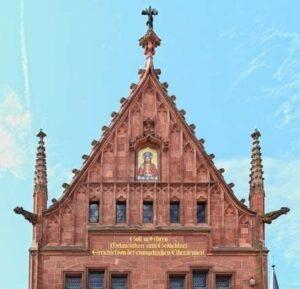Thereformer who introduced Melanchthon to France
Calvin, like many other French humanists, discovered the works of Melanchthon at the beginning of the 1540’s : these consisted of rhetoric, dialectics and philosophy, also his Loci communes, which had been republished many times since it had first come out in 1521. At that time Calvin was a law student and was also enthusiastically studying the classics and New Testament Greek. Under the protection of Marguerite de Navarre, he was beginning to move in protestant circles, both in Paris and Bourges. He first took up a stand for these new ideas when he wrote the speech for the Rector Cop, given on the Ist November 1533, which caused such a stir ; indeed, its contents show that he was influenced by Melanchthon’s Loci.
Several years later, when teaching in Strasbourg with Bucer, Calvin worked alongside Melanchthon during the colloquies organized by the Emperor with the aim of uniting the Church within the Empire – these were held in Haguenau, Worms and Ratisbonne. Calvin met him for the first time in Frankfurt in 1539 and from the beginning, Melanchthon treated him with respect and as a true friend.When Calvin became a reformer in Geneva in 1541, he continued to correspond with Melanchthon. In 1543, he dedicated a work to him : it was a political tract against Pighius, « one of the most violent supporters of the papacy », who « hated the thought of man’s freewill ».
It was very important for Calvin to inform the people of Geneva and indeed French –speakers as a whole, about the works of both Luther and Melanchthon.Theodore Beza, in his Vie de Calvin, insisted on the friendship between Calvin and Melanchthon : he also mentioned that, shortly before his death in 1560, Melanchthon had written to Calvin saying that « he would like to come to this Church in Geneva) to see him again and to take comfort from him. »





